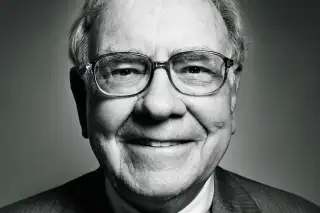One Weird Trick That Will Help You Beat the Market Like Warren

My story, Inside Buffett's Brain, is about the search by financial economists and money managers for persistent patterns in stock returns. Some of these patterns might help to explain why a handful of money managers, including Buffett, have done so well. The story is about more than Buffett, though. The hunt through past market data for potentially winning strategies is a big business, and has fueled the growth of exchange-traded funds (ETFs). So a word of warning is in order.
Here's the result of astoundingly simple Buffett-cloning strategy I put together, inspired by a "modest proposal" from Vanguard's Joel Dickson. All you have to do buy stocks with tickers beginning with the letters in "Warren." (You have double up on the "r" stocks, natch.)
This likely "works" in part because it's an equal-weight index—meaning each stock in the W.A.R.R.E.N. portfolio is held in the same proportion. Traditional indexes like the S&P 500 are "capitalization weighted," meaning they give more weight to the biggest companies in the market. Because smaller stocks have outperformed in recent years, equally weighted indexes have done pretty well compared to traditional indexes in the period in question.
So you might find out that you can also beat the market with an equally weighted basket of stocks whose tickers begin with the letters in your name too. Just cross your fingers and hope the trend doesn't reverse in favor of blue chips.
Another reason why this trick worked is that it picks from among current S&P 500 names, which means the stocks on the list are already in a sense known winners. Companies that used to be small and then graduated to the S&P 500 are on list, and companies that used to be big and then got small or disappeared aren't on the list. But you couldn't know which companies those were in 1993.
This is obviously dopey, and no way to run your money. (And the ideas I wrote about are much, much more sophisticated than this.) But there's a serious point here. ETFs are a great way to buy cheap, reliable exposure to the stock market. But these days most ETFs track not a simple well-known benchmark, but a custom index built upon rules which, if followed, are thought to give investors an edge. For example there are indexes which tilt toward companies with better-than-average sales, or which specialize in certain sectors or investment themes.
These indexes often have really impressive past performance. In theory. Based on "back tests" of market data, from before the index was actually in operation.
And of course they do. Today indexes are often created with an ETF launch in mind. So there's not much point in building an index and marketing it if you don't know that the strategy has already won. Unfortunately, knowing what's already worked in the past doesn't mean you know what will work in the future.
In fact, investors in new indexes are likely to be disappointed. Samuel Lee, an ETF strategist at Morningstar, explains that in any group of past winning strategies, a high number will have won just through sheer luck. The future average performance of those strategies is almost certain to decay. Because luck runs out.